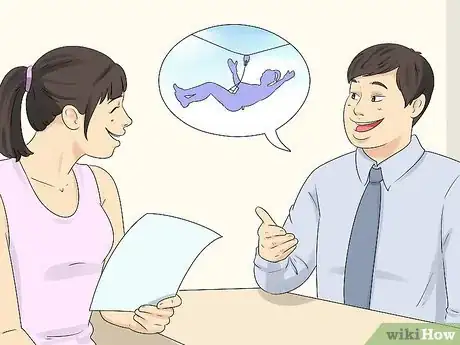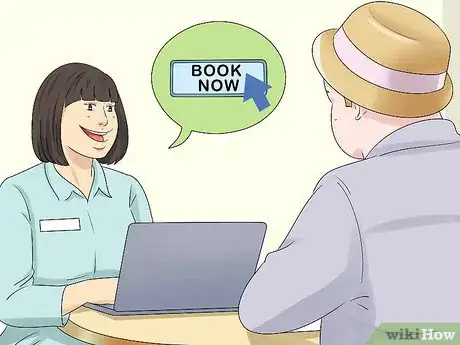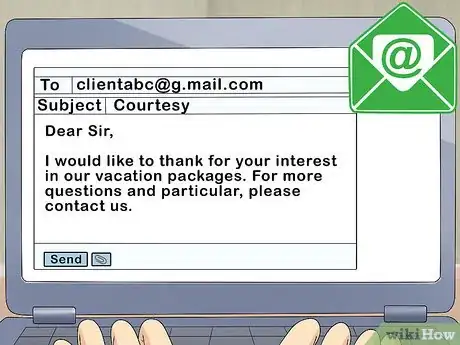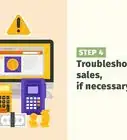This article was co-authored by Greg Guiteras. Greg Guiteras is the CEO of Lorraine Travel, LLC, one of the largest privately-owned travel management companies in Florida founded in 1948. With over 34 years of experience, Greg's specialties are in corporate travel management, sales and marketing, contract negotiations, strategic partnerships, and luxury hotel sales. Greg holds a BS in Marketing from Florida State University. Greg has also created WhataHotel!, a website offering exclusive perks on hotel bookings, and CabinMate, an app that matches single cruise travelers with potential cabin matches "in the same boat" to avoid traveling solo on a cruise.
There are 8 references cited in this article, which can be found at the bottom of the page.
This article has been viewed 45,688 times.
Not everybody finds the process of planning a vacation enjoyable. That's where you come in. As a travel agent or salesperson in the tourism industry, you can help your clients get where they want to go by asking specific questions about what kind of trip they're looking for, then laying out a few different options to find one that suits their preferences. After making a successful sale, follow up with an email to thank your client for their interest and increase the likelihood of earning their business again in the future.
Steps
Pitching the Right Package
-
1Ask the client questions about their ideal trip. Get the ball rolling by having your client give you an overview of the sorts of locales, accommodations, and activities they're looking for in a vacation. Tell them to be as specific as they please. By getting a sense of their preferences, you'll be able to pick out a package that's just right for them.[1]
- Start with a broad opener like, "What kind of weather do you enjoy?" before narrowing your focus to more a directed line of inquiry such as, "Would you prefer a hip resort with all the trappings, or a quiet, secluded bed and breakfast?"
- You can also ask your client about the last couple vacations they've taken, and what specifically they enjoyed during those experiences.[2]
- Some people might be looking for a sunny Caribbean cruise, while others may be more interested in an extended stay in the rustic European countryside.
-
2Find out what kind of budget the client is working with. Money can be a sensitive subject. A good way to broach the issue is by focusing on the person's wants rather than their limitations. For instance, instead of asking, “How much do you have to spend?” you could open with something like, “Are you looking for something simple and cozy, or are you more interested in the deluxe package with all the trimmings?”
- From here, you can eliminate options that don't meet your client's financial criteria.
- Rather than asking "what's your budget," ask your client what they've done on other vacations. What hotels did they stay in? What cruise line did they sail with? By knowing the brands they've used in the past, you can get a sense of what type of budget they're probably working with.[3]
- Avoid making statements that might be seen as invasive or judgmental, such as “I think a less expensive package would be a better choice in your case.” You don't want to risk alienating the person you're supposed to be working for.
Advertisement -
3Take your client's travel preferences into account. Consider the distance they'll have to cover to reach their destination. Would they rather get their by land, sea, or air? Will they need separate transportation once they arrive? These are practical concerns that will help travelers get where they're going more comfortably and conveniently.
- Let your client know about packages that feature optional upgrades, such as first-class airfare or a larger cabin.
- Be sure to mention if transportation isn't included, as this will create additional expense for the client.
- Remember that the distance of a trip doesn't necessarily impact the fare.[4]
-
4Recommend packages with tailored activities. Once your client has given you an idea of what they want from their trip, you can begin narrowing down their options based on the things they like to do. Built-in events and activities are a way of helping vacationers get more out of their leisure time. Sometimes, their decision to purchase a certain package may come down to the inclusion of a pair of concert tickets or windsurfing lessons.
- Adventurous souls might be tempted by a guided hike to a volcano or a ziplining adventure in the treetops, while those who are seeking some peace and quiet will likely get more satisfaction from a night at the opera or a day pass to a modern art exhibit. There's something for everybody!
Closing the Deal
-
1Redirect the client's attention away from last-minute doubts. Sometimes it's the price tag; other times, it's a matter of room size or departure times that are less than ideal. Whatever the issue happens to be, encourage your client to be candid with their thoughts and do your best to appease them by emphasizing the aspects they like and downplaying the ones they don't. Uncertainty is often just the result of last-minute nerves.[5]
- Be flexible. If there's something you can change about a package to make it more agreeable, offer to do it.
- Try not to treat your client's concerns as insignificant. This won't help you sell more packages—it will just show that you're placing your own interests ahead of theirs.
-
2Offer to help book a reservation right away. Typically, the longer the client takes to weigh their decision, the less likely they are to book. Prevent them from backing out by capitalizing on an opening to sign them up while they're still excited about what they've heard. That way, they won't have a chance to talk themselves out of it.[6]
- When a client is on the fence, giving them a heads up about how fast available bookings are being snatched up may give them the motivation they need to commit.
- You don't want your client to feel pressured, but you also don't want them to wait so long that they lose interest. If they tell you they need some time to think, ask them to get in touch with you the following day.[7]
-
3Follow up with a courtesy email. Shortly after you hang up the phone or show your client out, send them an email thanking them for their interest. Invite them to contact you if they have any more questions about the package they've chosen or the booking process in general. This is a small gesture that can make a big difference when it comes to making a client feel special.[8]
- Setting a friendly tone to your correspondence can increase the likelihood of the client coming back to you for future trips.
- Be sure to include all your important contact info in the signature of your email, including the email and phone number where you can be reached most reliably, a link to your professional website, and any related social media accounts.
Stepping up Your Sales
-
1Utilize multiple methods of communication. In general, you should aim to communicate with your client in the way that makes them most comfortable. However, the more platforms you take advantage of, the more of their attention you stand to grab. Unless your client tells you they want to stick to a certain format, mix it up—schedule an in-person consultation for your first meeting, call to discuss the finer details a day or 2 later, and follow up with the occasional email or text after that.
- Always include a clear call-to-action that tells the client what you want them to do, such as, “Call me back at your earliest convenience,” or, “Let me know what you think about that 2 week all-inclusive Aruba trip we talked about.”
- Ask your client what hours are best to call during the day so you don't phone at an inopportune time.
-
2Establish yourself as an expert. Before you throw out your most effective sales pitch, you should first give the client a reason to trust what you're telling them. The best way to do this is to educate yourself on the particulars of the various packages you have to offer so you can explain them in detail with authority. Stress that your job is helping your clients plan the perfect getaway by considering all the different variables, not simply giving them a list of options to choose from.[9]
- Try dropping subtle hints that point to your experience, like, “I've been in the business for 12 years, and I'm proud to say that I've never had a client walk away unhappy.”
- Anyone can quote a price. A true salesperson sells themselves as much as the product they're representing.
-
3Find ways to connect to the client. As you're speaking, listen closely and pick up on things that the two of you have in common. Perhaps you graduated from the same university, or they're in the same line of work as one of your siblings. Highlighting your similarities will help put the buyer at ease and add a personal dimension to your relationship.[10]
- If the client is particularly fond of Key Largo, for instance, you might mention the fact that your family has been vacationing there since you were a child.
- Be careful not to let your observations come across as forced. It may make you seem like you're trying too hard to be relatable.
-
4Offer direct booking discounts to keep your client from booking online. Don't discourage your client from searching for a better deal online—chances are, they've already done this anyway. Instead, have them inform you if and when they track down a more appealing alternative. It may sound counterintuitive, but it presents you with an opportunity to match or even beat the competitor's price.[11]
- These days, more and more people are turning to the convenience of the Internet over travel agencies and other traditional booking services. To avoid losing a potential sale, the key is not to but to treat it like a bad thing but use it as a tool for promoting your own business.
-
5Line up other potential buyers. Before parting ways with a satisfied client, set yourself up for a referral. Ask them to get in touch with you if they know someone who might be in the market for a dream vacation. Your cold calls won't feel as cold if they come with a personal recommendation.[12]
- If you don't work for an agency, get creative when it comes to digging up leads. You might call up new residents in the area that fit your target demographic, or try advertising your services on social media.
- Use community events as an opportunity to network. This is a great way to get partnered with local businesses for a little affiliate marketing.[13]
Expert Q&A
-
QuestionHow do you sell someone a trip?
 Greg GuiterasGreg Guiteras is the CEO of Lorraine Travel, LLC, one of the largest privately-owned travel management companies in Florida founded in 1948. With over 34 years of experience, Greg's specialties are in corporate travel management, sales and marketing, contract negotiations, strategic partnerships, and luxury hotel sales. Greg holds a BS in Marketing from Florida State University. Greg has also created WhataHotel!, a website offering exclusive perks on hotel bookings, and CabinMate, an app that matches single cruise travelers with potential cabin matches "in the same boat" to avoid traveling solo on a cruise.
Greg GuiterasGreg Guiteras is the CEO of Lorraine Travel, LLC, one of the largest privately-owned travel management companies in Florida founded in 1948. With over 34 years of experience, Greg's specialties are in corporate travel management, sales and marketing, contract negotiations, strategic partnerships, and luxury hotel sales. Greg holds a BS in Marketing from Florida State University. Greg has also created WhataHotel!, a website offering exclusive perks on hotel bookings, and CabinMate, an app that matches single cruise travelers with potential cabin matches "in the same boat" to avoid traveling solo on a cruise.
Travel Specialist To sell a trip, you need to qualify your customer. Get a sense of what they've done on other vacations and what they liked about it. Where did they stay? What did they do? This can give you a sense of what type of budget they want. Do they want a mid-range trip? Is this an affluent person who only wants the best brands? You also want to ask the five W's: who, what, when, where, why, and how. Why did they call you? How did they learn about you? This will help you determine what type of trip might be best for your customer.
To sell a trip, you need to qualify your customer. Get a sense of what they've done on other vacations and what they liked about it. Where did they stay? What did they do? This can give you a sense of what type of budget they want. Do they want a mid-range trip? Is this an affluent person who only wants the best brands? You also want to ask the five W's: who, what, when, where, why, and how. Why did they call you? How did they learn about you? This will help you determine what type of trip might be best for your customer.
References
- ↑ http://www.travelweekly.com/Travel-News/Travel-Agent-Issues/Insights/Before-selling-a-vacation-agents-should-sell-themselves
- ↑ Greg Guiteras. Travel Specialist. Expert Interview. 18 September 2020.
- ↑ Greg Guiteras. Travel Specialist. Expert Interview. 18 September 2020.
- ↑ Greg Guiteras. Travel Specialist. Expert Interview. 18 September 2020.
- ↑ https://www.entrepreneur.com/article/306649
- ↑ https://www.vrmb.com/phone_sales/
- ↑ https://boss.blogs.nytimes.com/2011/07/25/my-top-10-sales-tips/
- ↑ http://www.travelagewest.com/Travel/Trending/6-Tips-for-Selling-More-Group-Travel/#.Wmf4AqinHIU
- ↑ http://www.travelweekly.com/Travel-News/Travel-Agent-Issues/Insights/Before-selling-a-vacation-agents-should-sell-themselves









































































